Introduction
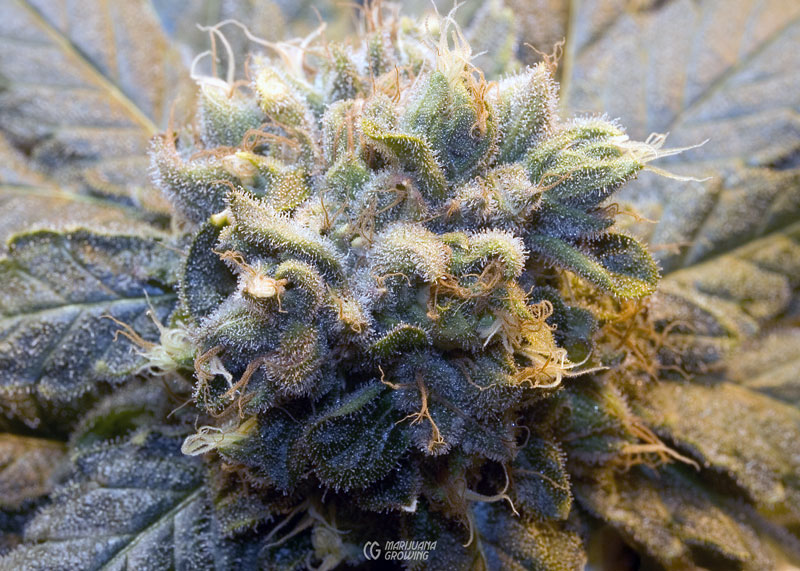
Harvest when plants are at peak ripeness. Harvest timing is critical. The peak harvest window is open for roughly 5–7 days. Most growers manicure harvested buds before drying them slowly and evenly, so THC is preserved. After drying, buds must cure so that full aroma and flavor develop. Like a fine wine, aging (curing) improves taste and fragrance. Once cured, proper storage will ensure buds retain all of their essential qualities.
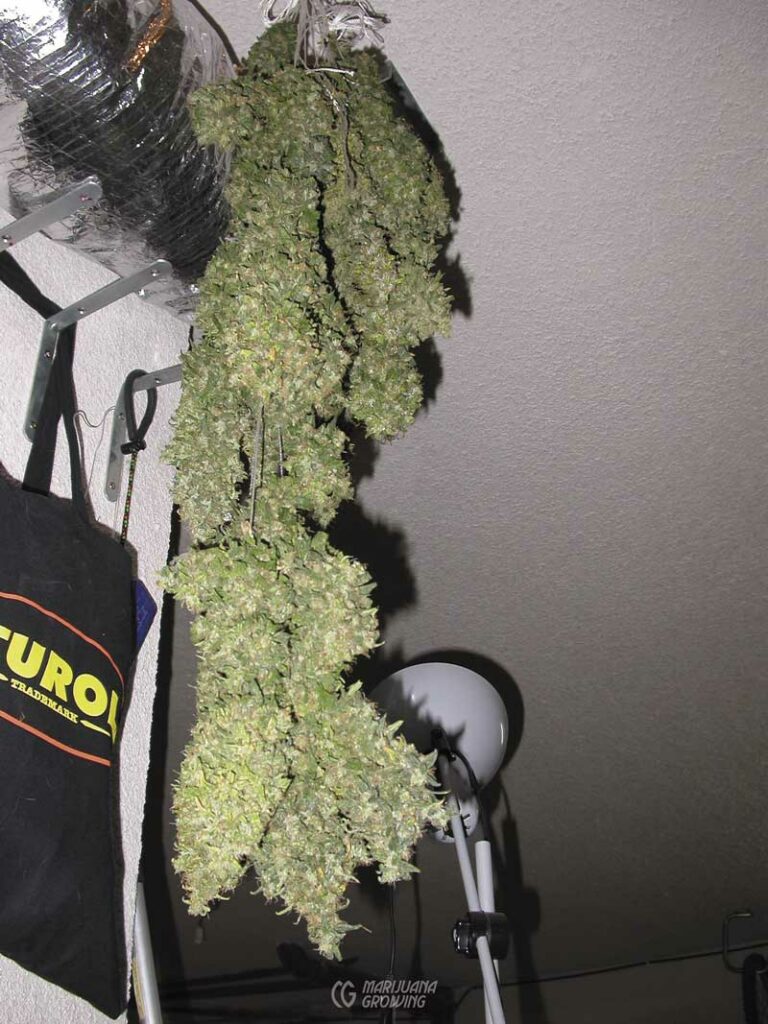
Pungent marijuana odors are often a problem around harvest time. To minimize odors keep the drying and trimming room well ventilated so fragrances do not linger. Keep rooms cool, below 70°F (21°C) so essential cannabis oils release few pungent aromas. An air conditioner works well to keep odors to a minimum in sealed rooms. A carbon filter will remove odors in the drying/ manicuring room and will also treat expelled air.
Before Harvest
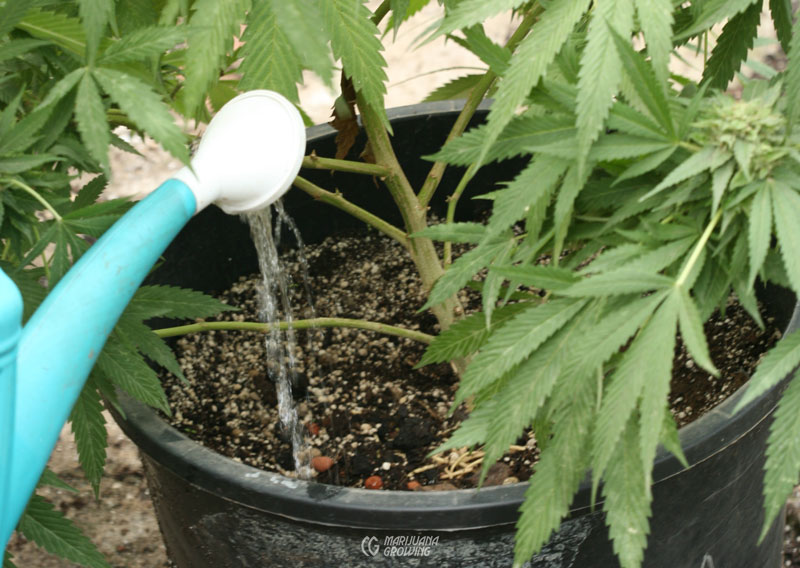
Irrigate with plain water. Give plants plain water the last 7–10 days before harvest. Make sure to let 10–20% of the water drain out the bottom of containers.
Do not water for 1–2 days before harvest, so plants are pre-dried at harvest. Let the soil dry out but do not let the plants wilt.
Harvest
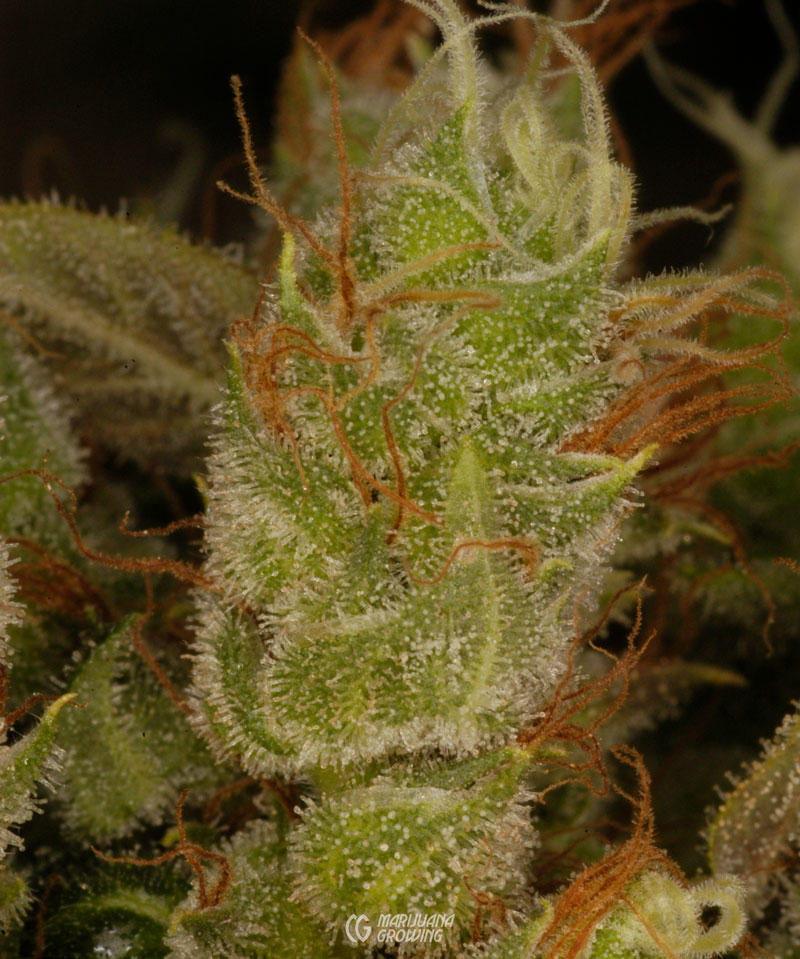
At harvest all plant growth and THC production stop. THC content cannot increase after harvest. In fact, it can only decline. Slow THC decomposition by keeping harvested buds out of extended exposure to light and warm temperatures (above 80°F [27°C]); jostling and bruising from handling; and damp, humid environments.
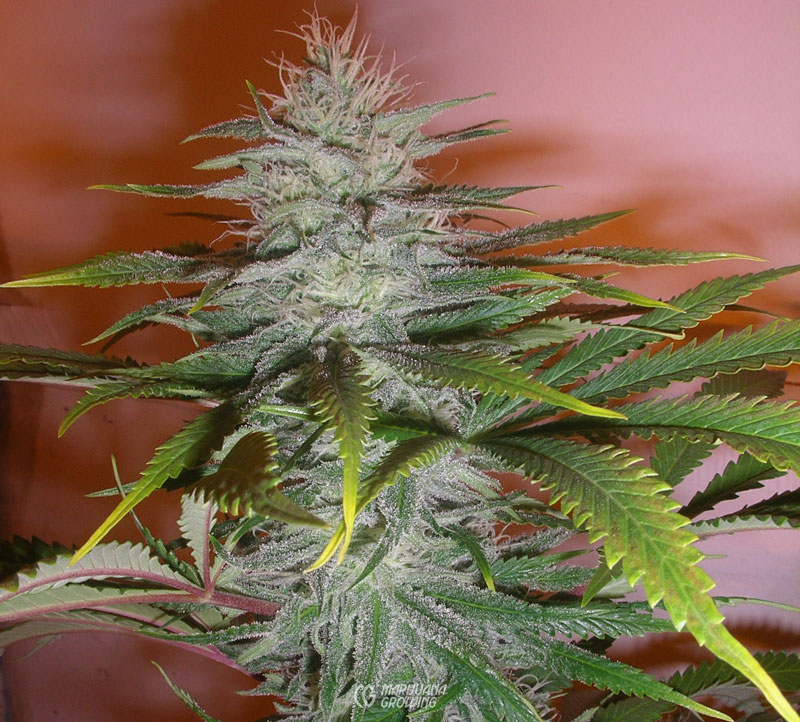
Mind-bending psychoactive THC (tetrahydrocannabinol) is located in leaves, flower buds, and trichomes. The majority of THC is found on female (sinsemilla) plants in the resin glands or trichomes on flower tops. Stalked trichomes look like a small post with a ball on top. These trichomes develop most heavily on buds and small leaves. THC is most concentrated where the stalk meets the ball of the resin gland.
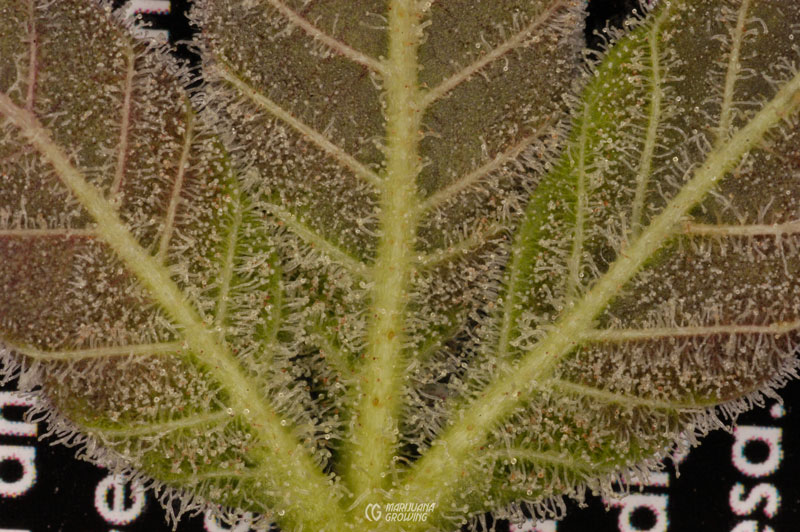
Large female leaves like the Yumboldt at right and male plants contain fewer resin glands and much less mindaltering THC. The THC content found in stems and roots is virtually non-existent. Male plants, stems, and large leaves hold low levels of THC and are most efficiently used to make hash, concentrated resin.
Harvest Leaves
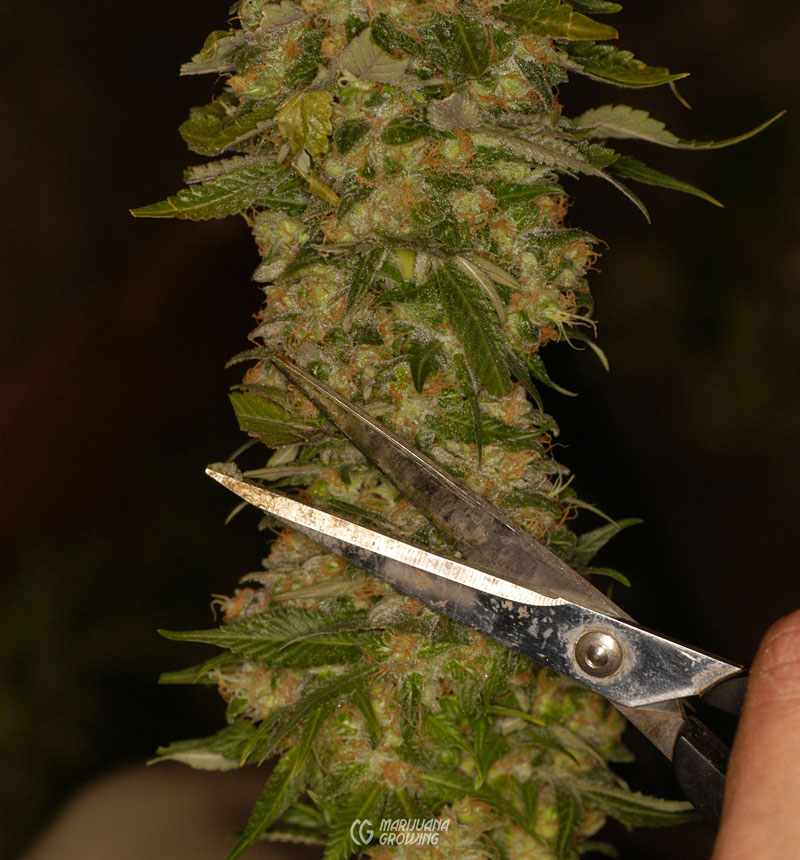
Remove large leaves while plants are still in the ground. Cut or pluck off the entire leaf and leaf stem. Once the large leaves are fully formed, THC potency has generally peaked. Smaller leaves around buds continue to develop resin until buds are ripe. Peak potency is retained as long as leaves are healthy and green. Harvest yellow and diseased leaves and dispose of them.
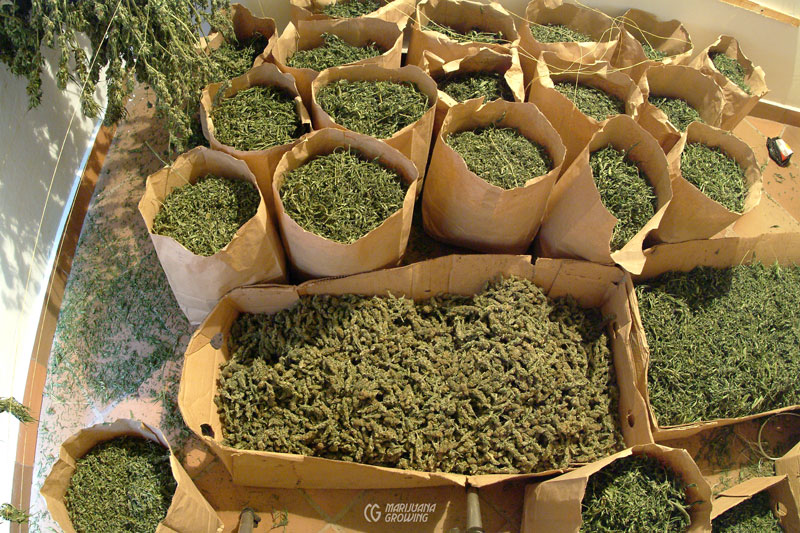
Toss leaves into a paper bag, not a plastic bag. Paper bags breathe well and can be closed by folding over the top.
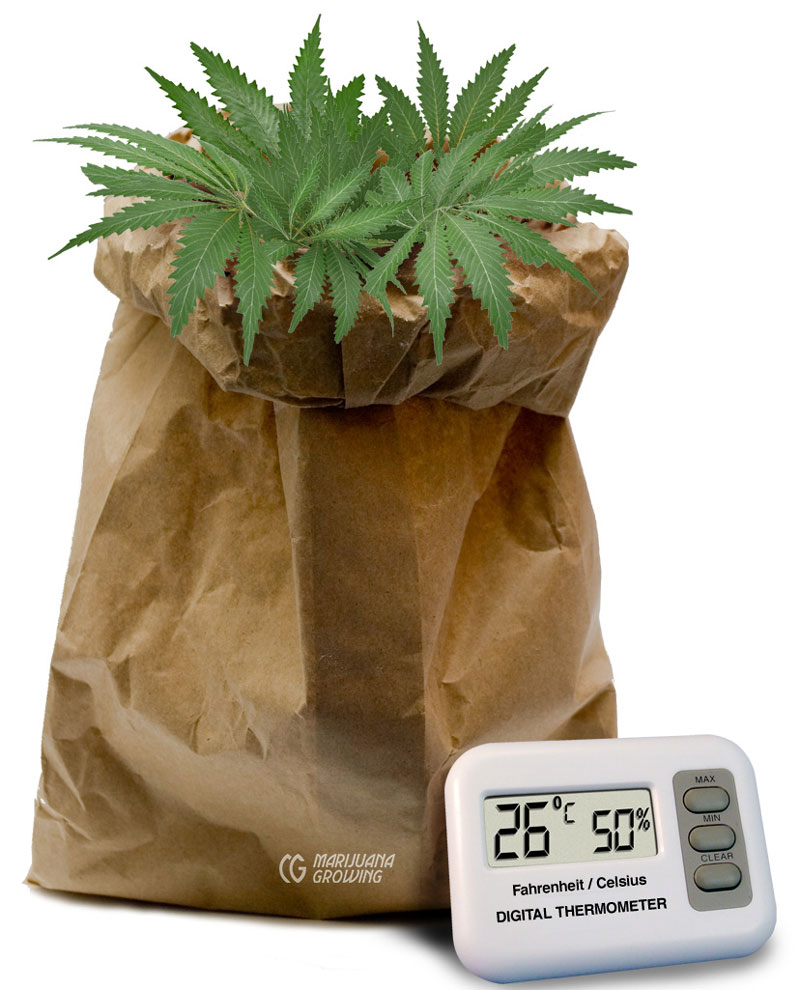
Keep the paper bag in a closet or area with 55-60% humidity and 65°–75°F (18°– 24°C) temperature. Reach into the bag once or twice a day and turn leaves so the moist leaves mix with drier leaves. Leaves will be dry to the touch in 5–7 days. Once dry, place leaves in the freezer so they are ready to make hash.
Male Harvest
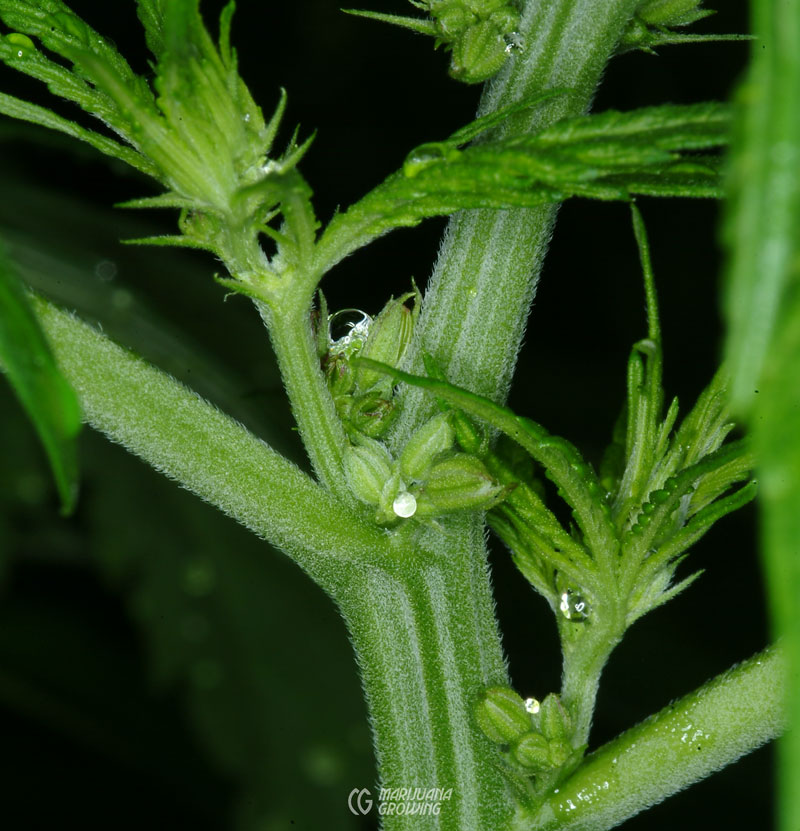
Male plant in early flowering. The white spots are drops of water.
Harvest male plants before they disperse pollen. Most growers remove them from the garden as soon as they are spotted at pre-flowering, near the end of vegetative growth. Male flowers produce visible pollen sacks with viable pollen 2–4 weeks after lights are set to a 12-hour day/night photoperiod.
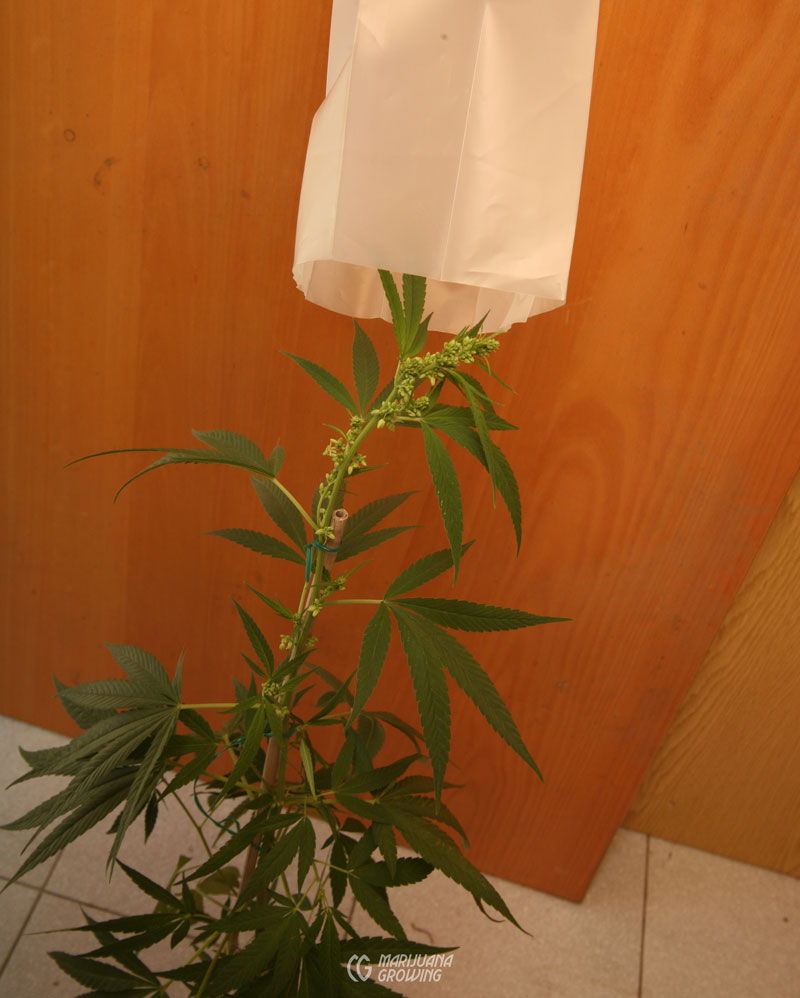
Put a plastic bag over any male plants that might disperse pollen before cutting the main trunk off at the base. Shake the plant as little as possible to minimize any pollen dissemination. See Marijuana Horticulture: The Indoor/ Outdoor Medical Grower’s Bible for complete information on breeding.
Sinsemilla Harvest
Harvest sinsemilla plants 6–12 weeks after inducing flowering with the 12/12 day/night photoperiod. Harvest at the point when THC production is at its peak, before it starts to degrade. Most plants that receive the same amount of light throughout are ready to harvest at the same time. Lower buds that receive less light often take a few more days to mature.
In general, indica and indica-dominant strains are ripe 6–8 weeks after initiating flowering. Sativa and sativa-dominant strains are ready to harvest in 8–12 weeks. Too often growers harvest too early because they are excited to have a crop.
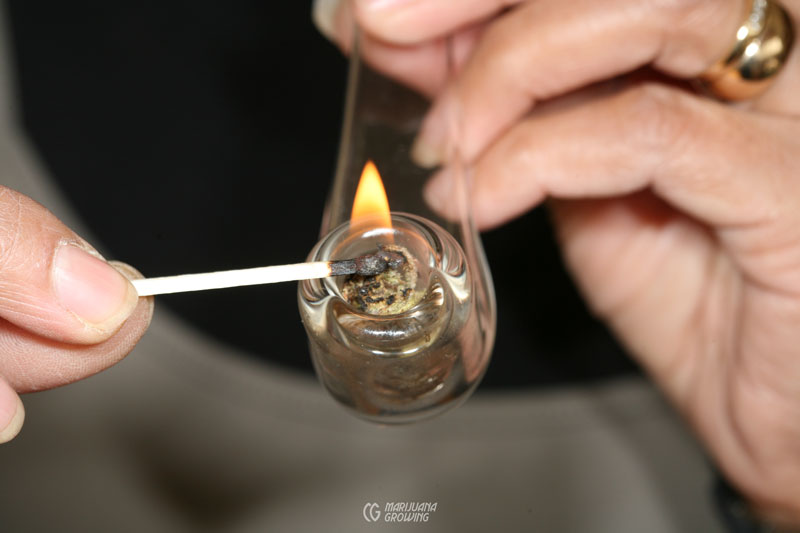
Test for ripeness by removing a small piece of a mature bud. Put it in a microwave oven or conventional oven. Set the microwave on a low power setting and turn on in 10- second bursts until it is dry enough to burn. Place a little bit of the dry bud in a single-hit pipe and sample. The dry, raspy taste will be from fast drying, but you will be able to tell how potent the pot is.
Too Early!
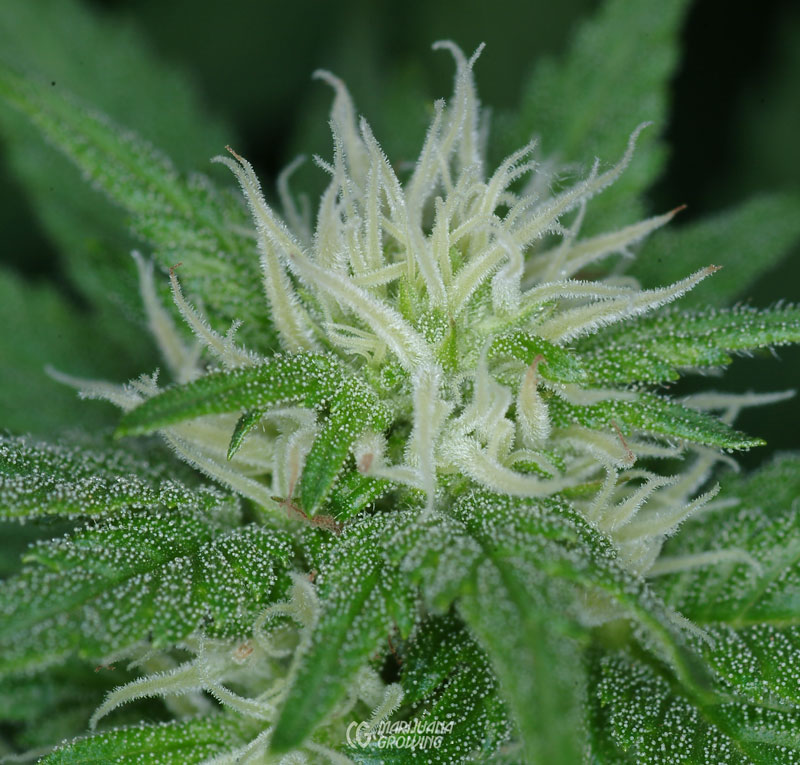
This bud is weeks from harvest. Wait at least 6 weeks before testing buds for harvest. Many growers harvest lightweight buds before THC develops to full potential.
Early Harvest
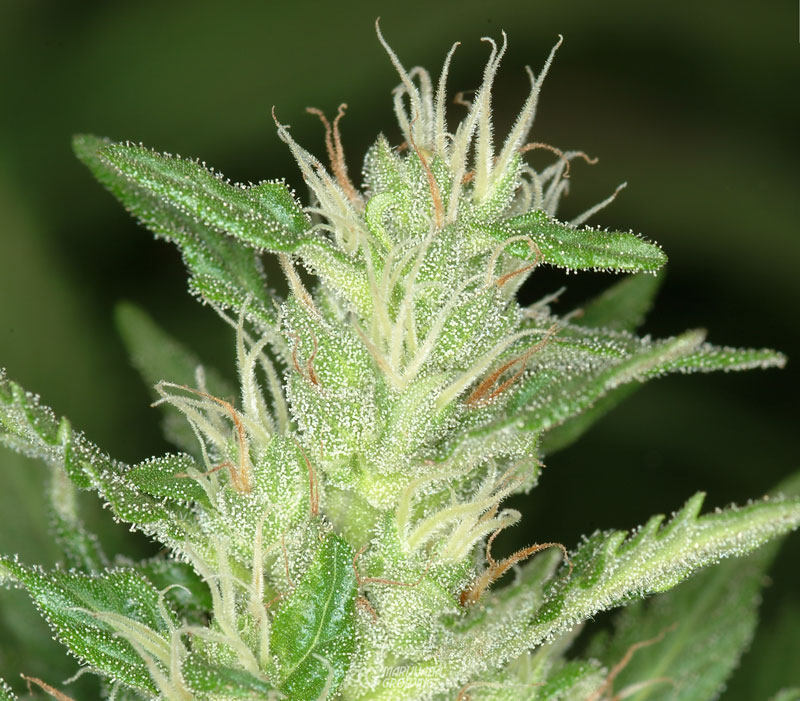
This bud is still a couple weeks from harvest. The healthy, white fuzzy pistils are still growing and the resin is really starting to accumulate. After a couple of weeks, this bud will be packed with resin. Buds harvested now will yield up to 30% less weight.
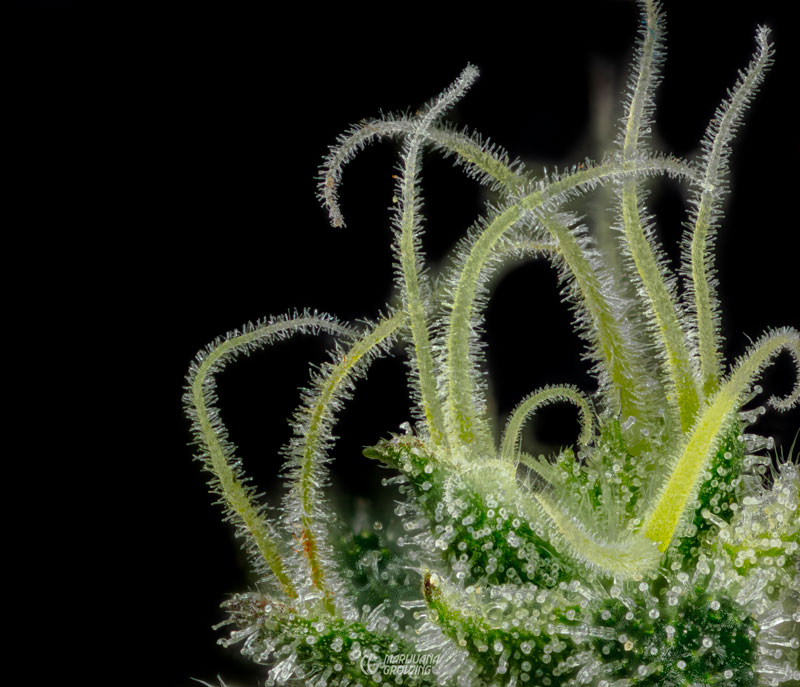
Small clear capitate-stalked trichomes are developing on this cannabis flower. Note the stigmas are vibrant white, rather than dying back. Both clear new trichomes and white fuzzy female stigmas tell you that harvest is a few weeks away
Peak Harvest
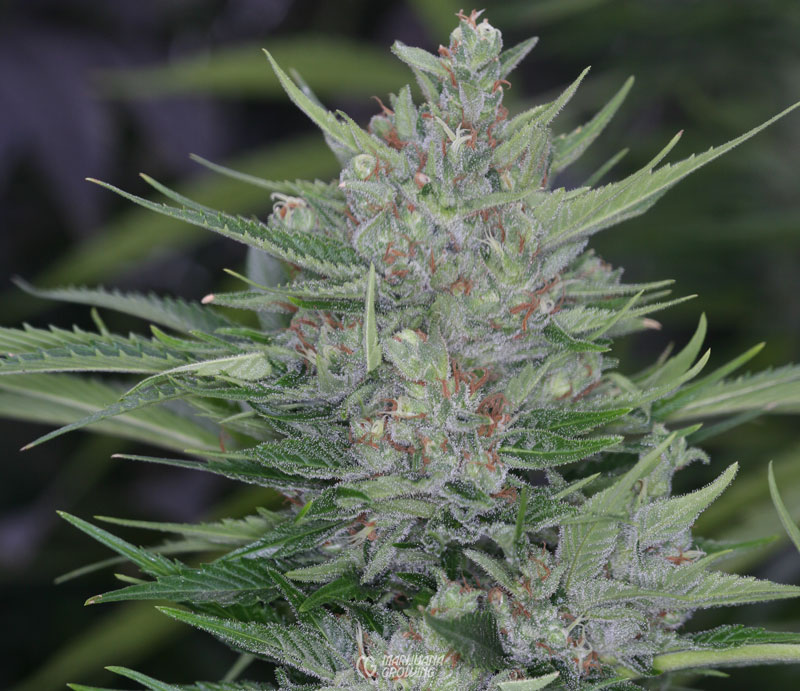
Resin gland formation slows. Trichomes are starting to degrade faster than they develop. THC production has peaked out. Now is the best time to harvest.
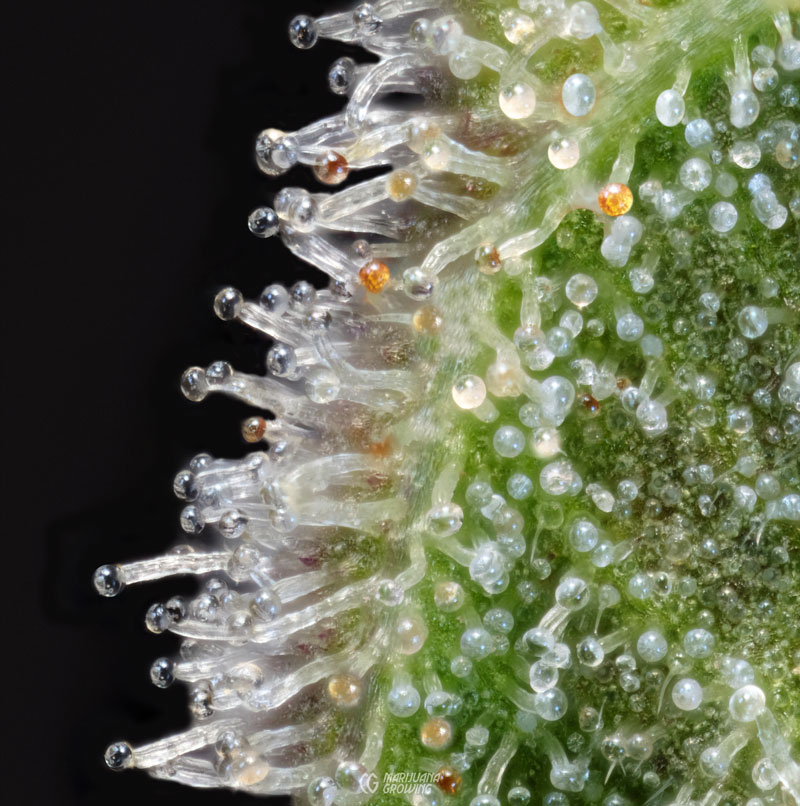
Harvest when THC levels are at their peak for maximum mind-bending effects. This close up of trichomes shows you what to look for at the time of peak maturity.
Late Harvest
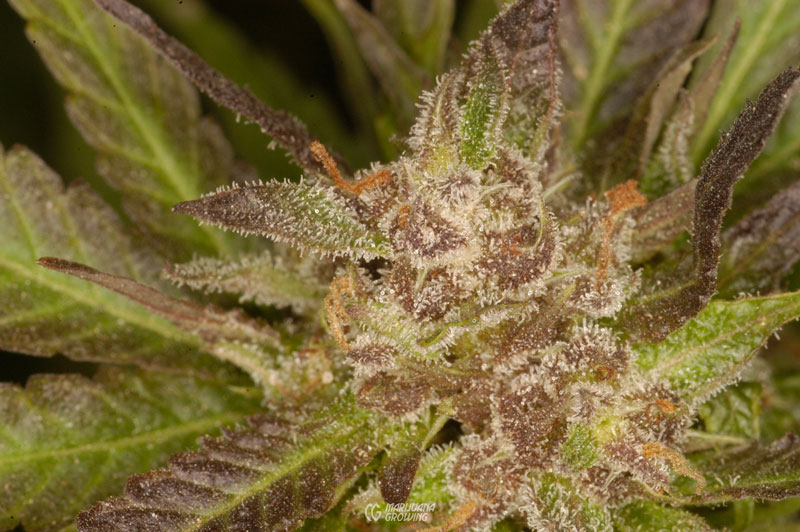
Trichomes start to degrade faster and faster. Harvest now for a heavier high.
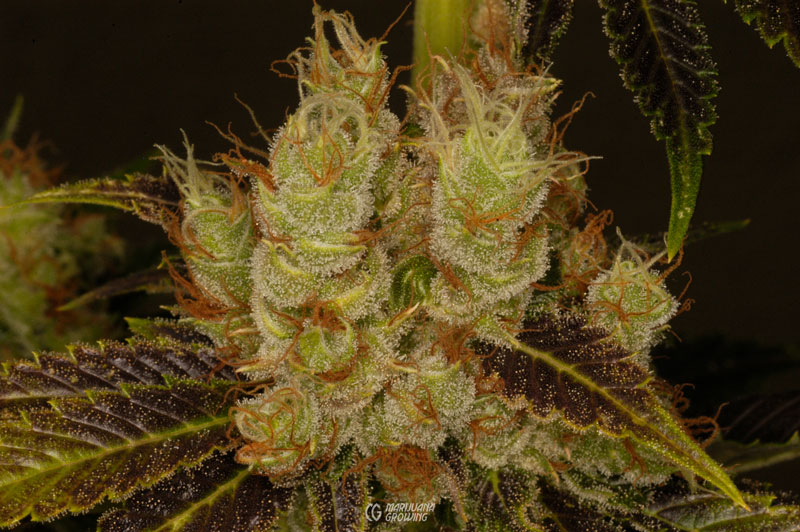
White stigmas turn brownish-red as buds continue to ripen. In some strains, peak potency is when half of the pistils are white and the other half have turned brown. This test is only a general guide to peak potency.
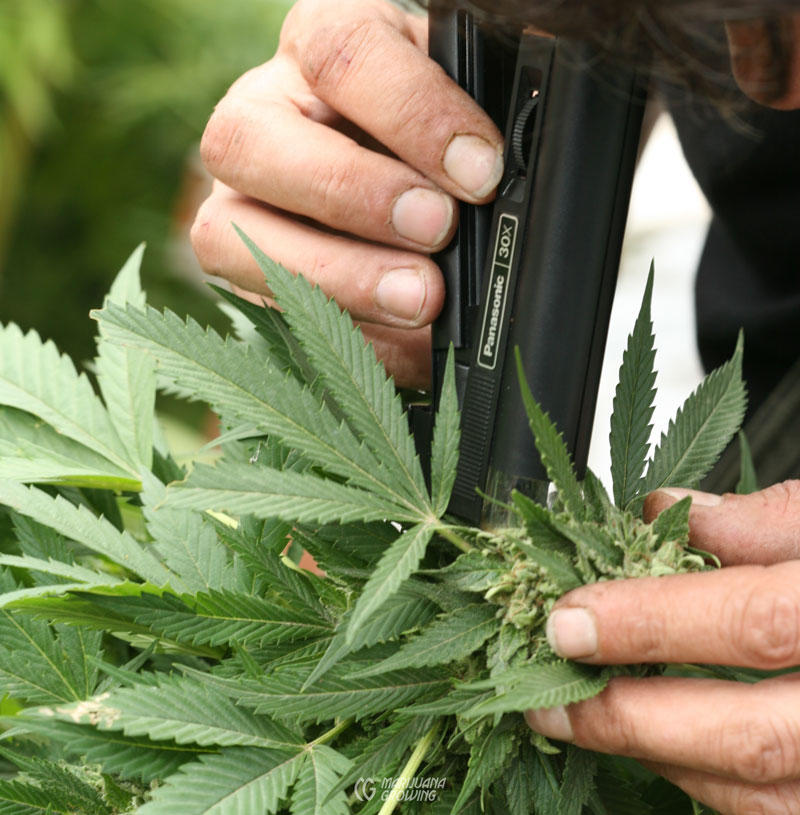
The most accurate way to tell peak potency is to look at resin glands on growing plants with a 10X–50X magnifier. My favorite is a 30X handheld microscope with a batterypowered light. You can quickly check several buds daily for peak potency.
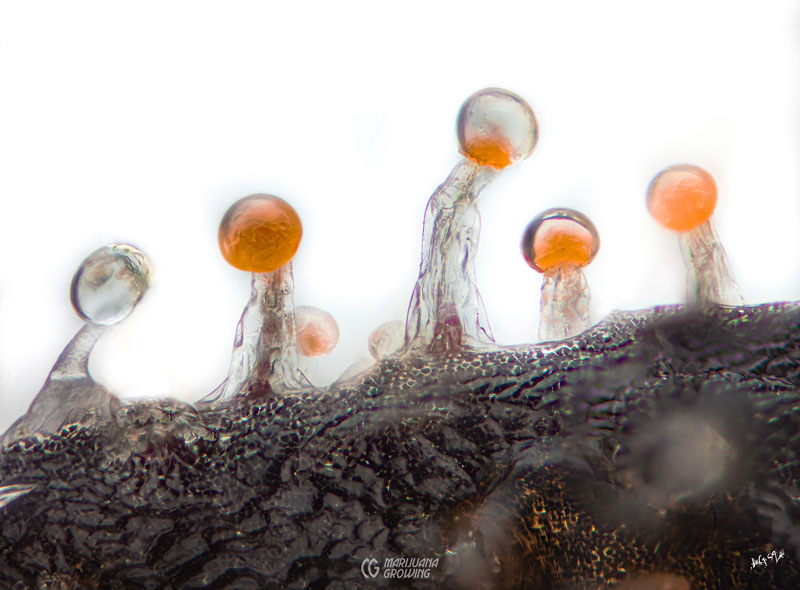
Amber capitate-stalked resin glands signify late flowering. This is the point that resin becomes more delicate and degrades more quickly. Harvest plants before the heads of resin glands start to break off.
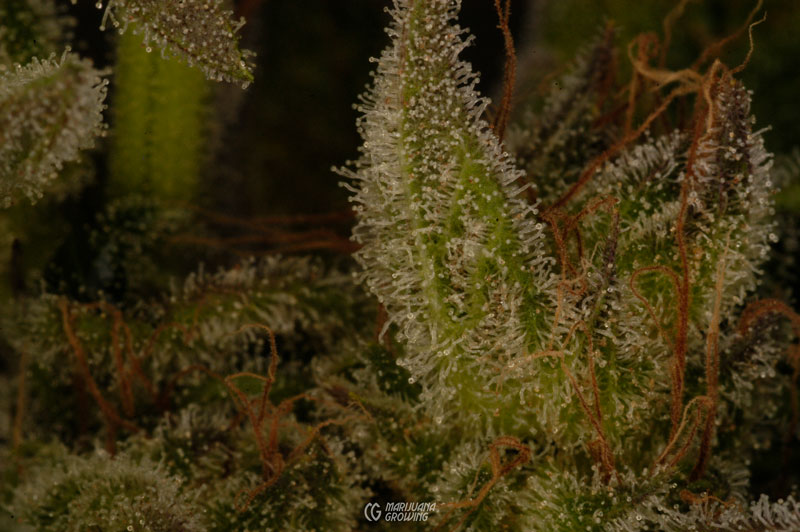
Look at the capitate stalked trichomes, the ones with a ball on top of the stalk. They develop clear to translucent resinous trichomes. More and more well-formed trichomes continue to appear as they reach peak potency. Harvest when these resin glands form more slowly than they degrade. Bulbous tops and stalks start to deform when they degrade. Handling buds will bruise and deform resin glands. Such damaged resin glands should not be confused with naturally deteriorating ones.
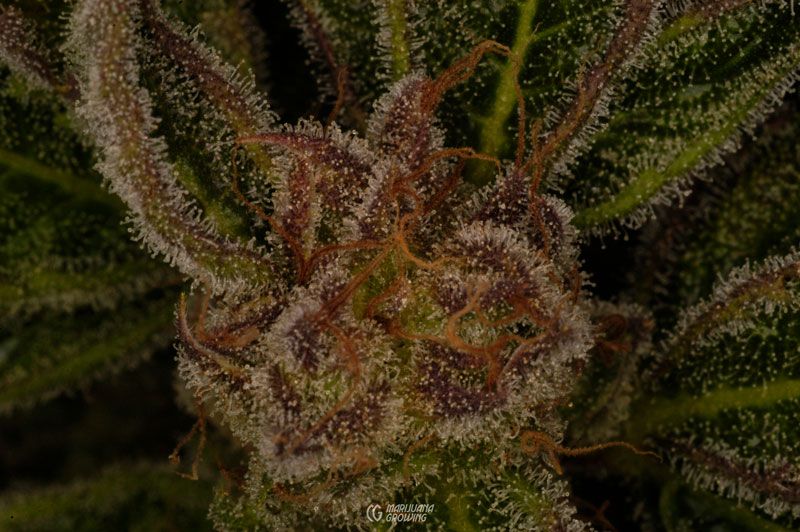
Often resin glands on strains change colors and deteriorate as plants ripen. The trichomes turn from clear to translucent to amber. All glands do not change color at the same time.
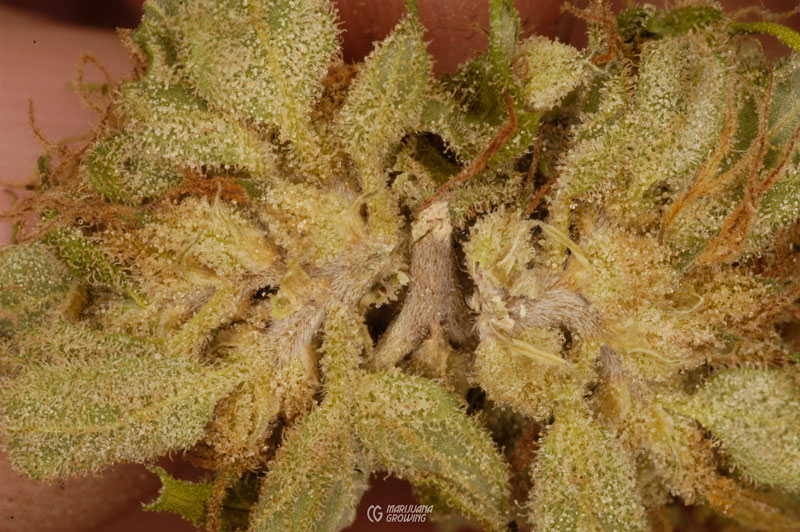
Hair-like cystolith trichomes contain no THC. They are visible with the naked eye and with magnification. Find these protective trichomes on tops and bottoms of leaves, stems, and buds. They exude substances that repel pests and protect foliage from diseases.
Step-by-Step: Harvest
Step One
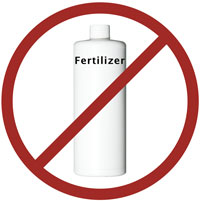
How to tell when fertilizer will affect taste
• Leaf tips and fringes re burned
• Leaves are brittle at harvest
• Buds crackle when burning
• Buds smell like chemicals
• Buds taste like fertilizer
Stop fertilization 7-10 days before harvest. This will allow plants to use built-up nutrients in foliage.
Step Two

Do not spray plants during harvest week so there are no unwanted residues on foliage at harvest. Sprays can also linger in dense buds, which may attract bud mold.
Step Three
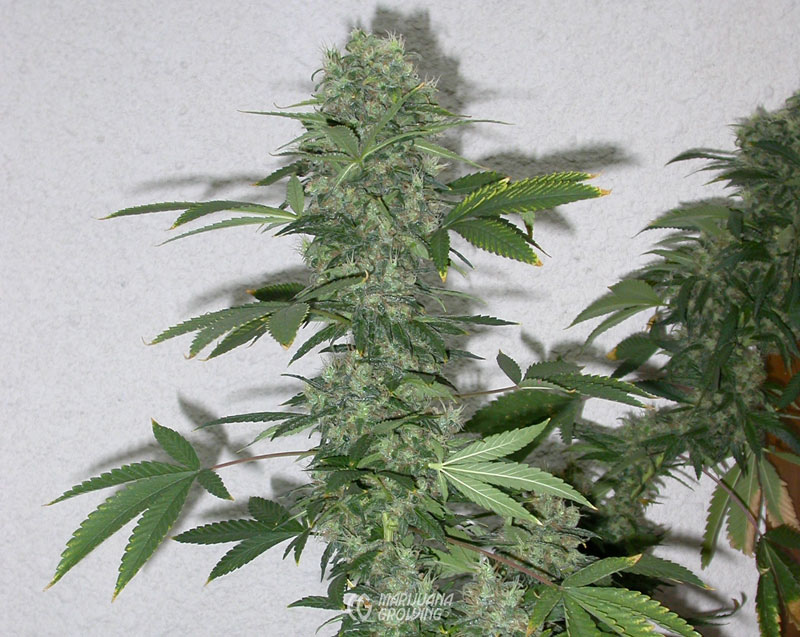
Cut or pluck off large leaves and leaf stems a day or two before harvest. This will speed the rest of the harvest process, and it does not diminish harvest.
Step Four
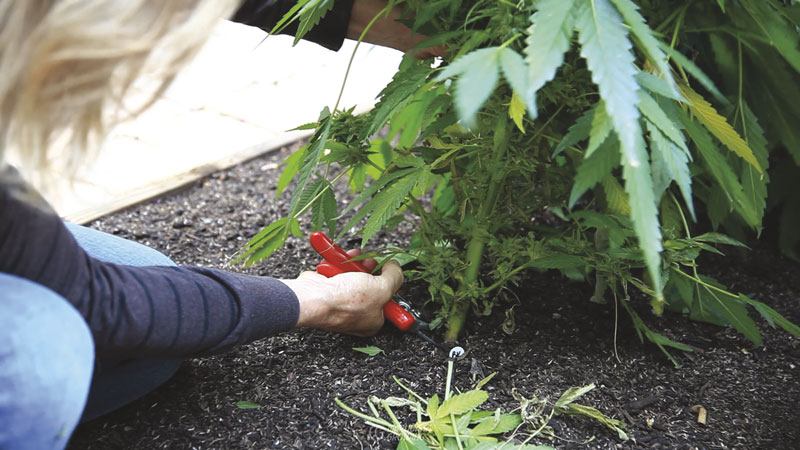
Use pruners to cut plants at the base or remove one branch at a time. Cut branches into lengths of 6–24 inches. Do not remove the root ball, it contains absolutely no THC.
Step Five
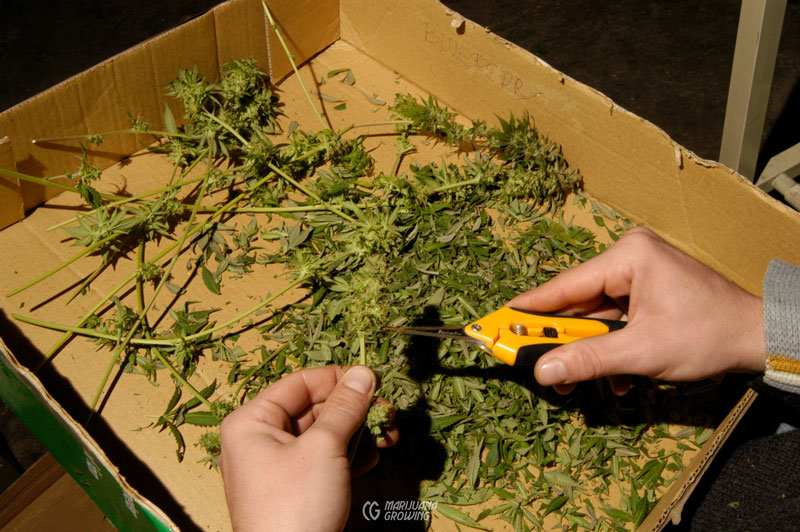
Manicure buds right after harvesting. Trim off smaller leaves around buds that show little resin. Use small, pointed scissors to get into tight spaces in buds. See “Manicuring” later in this chapter.
Step Six
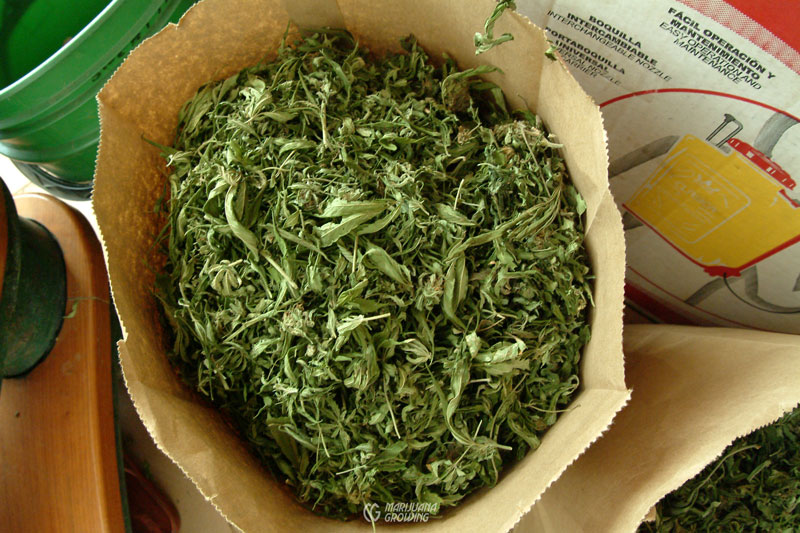
Save all trimmed leaves in a paper bag so they can be made into hash later.
Step Seven
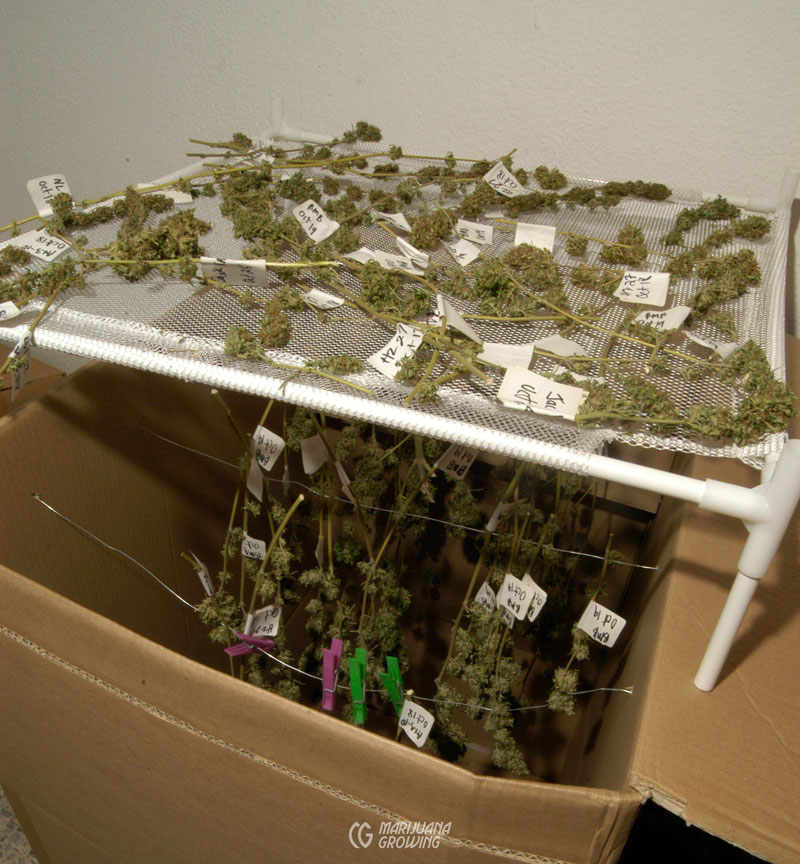
Hang manicured branches from drying lines or place on drying racks. Keep the temperature at 65°–75°F (18°–24°C) with the humidity about 55%. Feel buds to check for dryness. They should be dry enough to cure in four to seven days.
Step Eight
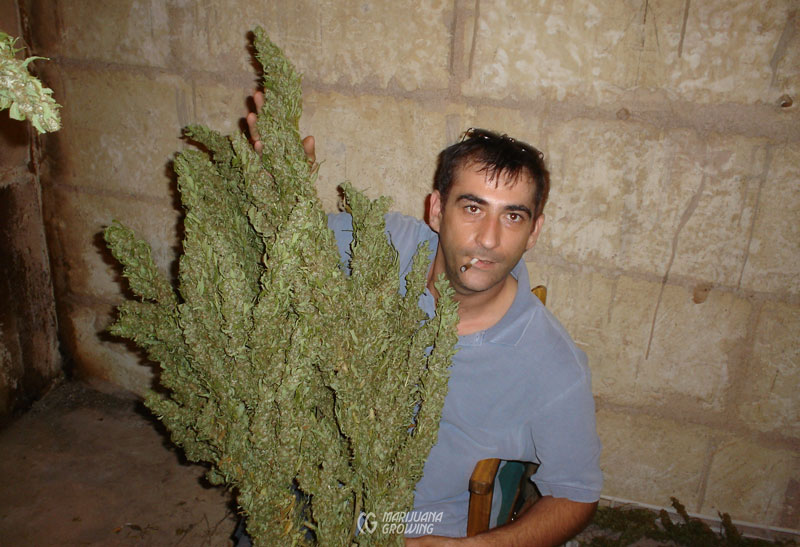
Once buds appear to be dry, they are ready for the final drying or curing.
Manicuring Cannabis
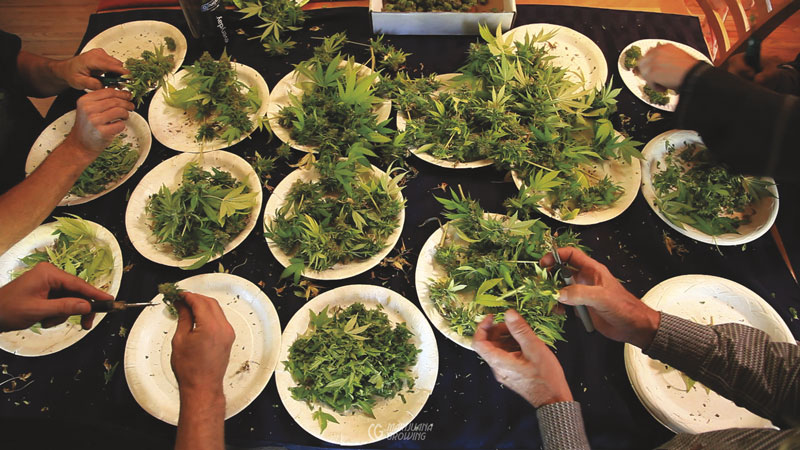
After harvest the crop must be manicured, dried and cured.
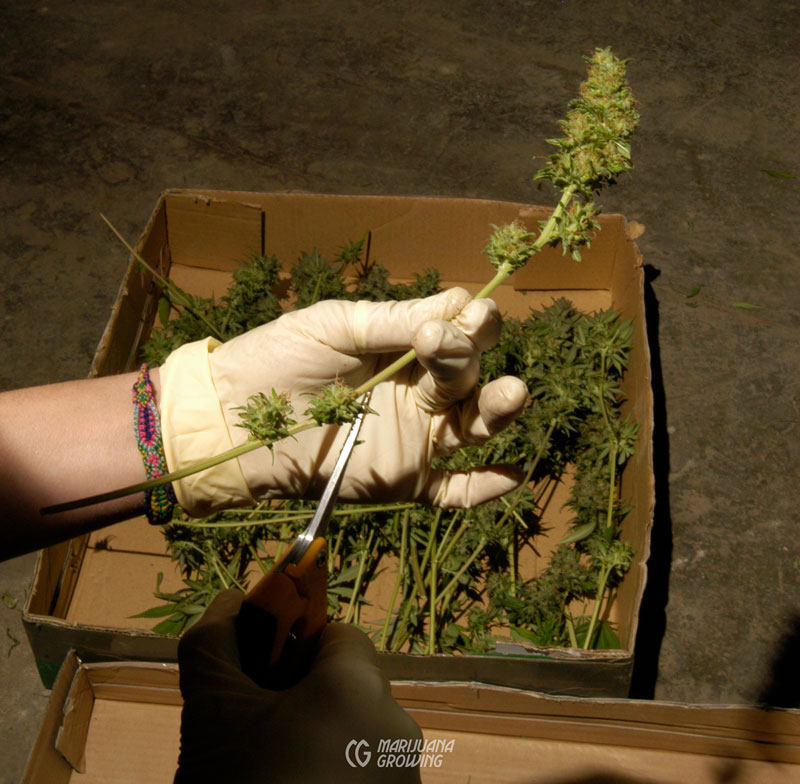
Manicuring buds is time-consuming. Budget 4–6 hours to manicure a single pound (454 gm) by hand with scissors. An automatic trimmer will cut manicuring time to 1–2 hours.
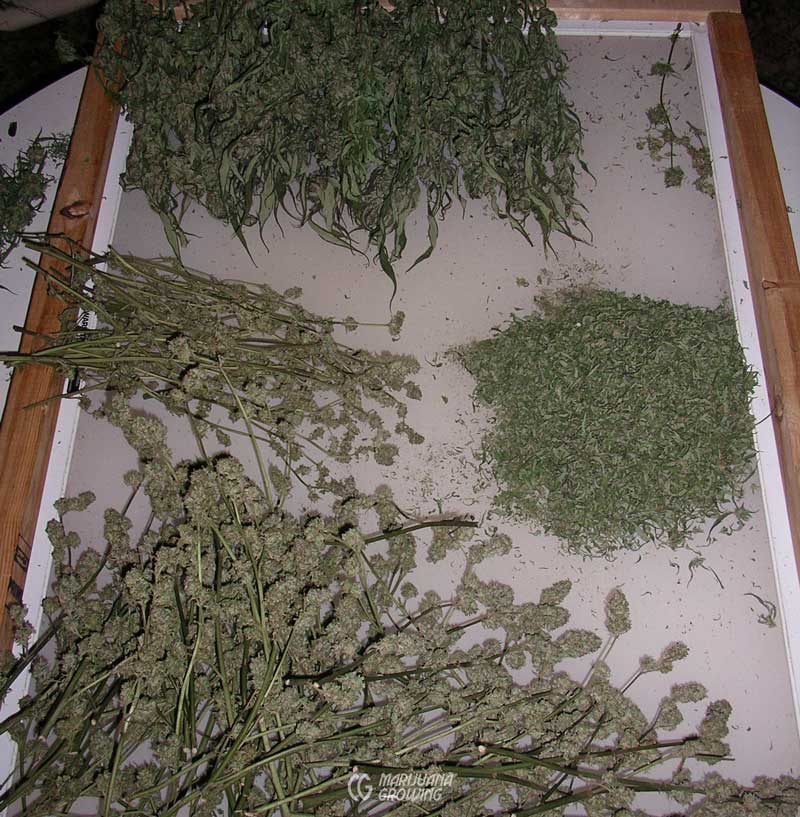
Manicure over a fine silkscreen, glass, or slick-surfaced table. Scrape up fallen resin glands on the table or under the screen. This potent resin can be smoked immediately or pressed into blocks of hash.
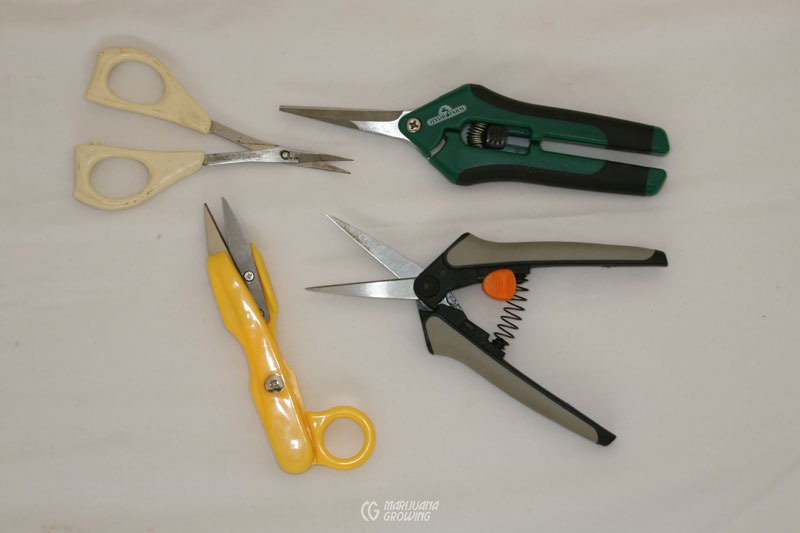
Use small easy-to-maneuverer pointed scissors to reach into crevices in buds. Have 2 or 3 different pairs of scissors available. Switch scissors when your hands fatigue.
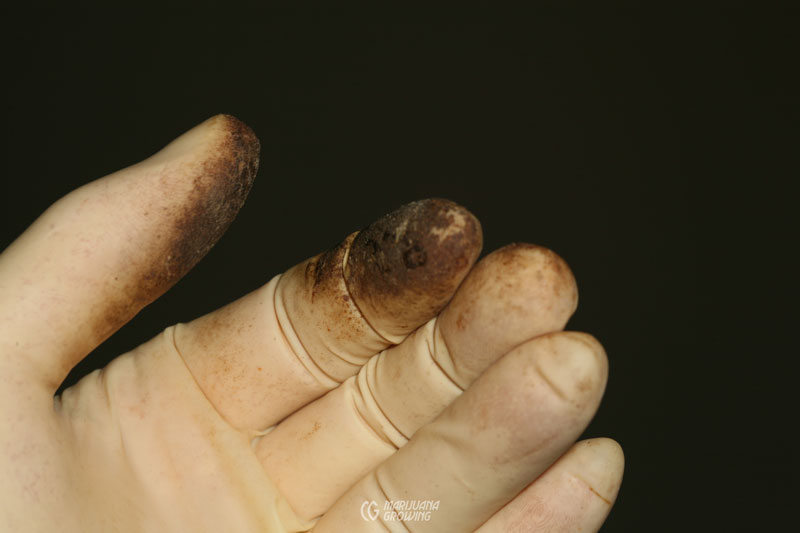
Wear inexpensive rubber gloves to collect “finger hash.” After trimming, remove accumulated finger hash on gloves with rubbing alcohol. Set the hash-laden alcohol on the counter overnight to evaporate. Scrape up the remaining hash after all the alcohol has evaporated. Or put the rubber gloves in a freezer for a few hours. Cooling will make it easier to scrape and rub the accumulated hash from the gloves.
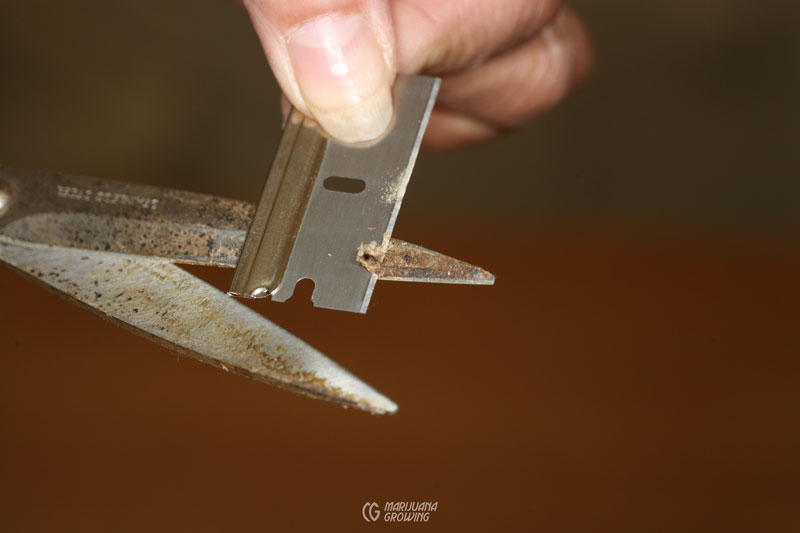
Scrape accumulated resin from scissors when it clogs blades. Use a small knife to remove built-up resin from blades. Ball up small bits of scraped resin by rubbing it together between fingers. The ball of hash will grow as manicuring progresses.
Drying Cannabis
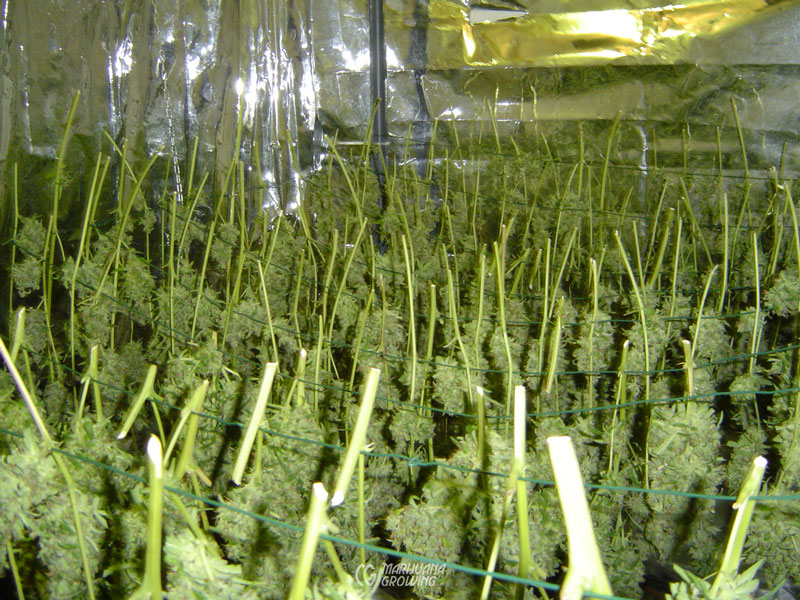
Fresh green marijuana is not very potent. Drying converts a little of THCA into its psychoactive form, THC, and removes about 75% of the moisture from freshly harvested plants.
Moisture evaporates evenly when plants are dried slowly over 5–7 days or longer. Buds are dry throughout so will taste sweet and smoke smoothly. Buds dried too quickly retain chlorophyll and other substances within foliage. Such poorly dried cannabis tastes “green,” burns unevenly, and tastes bad.
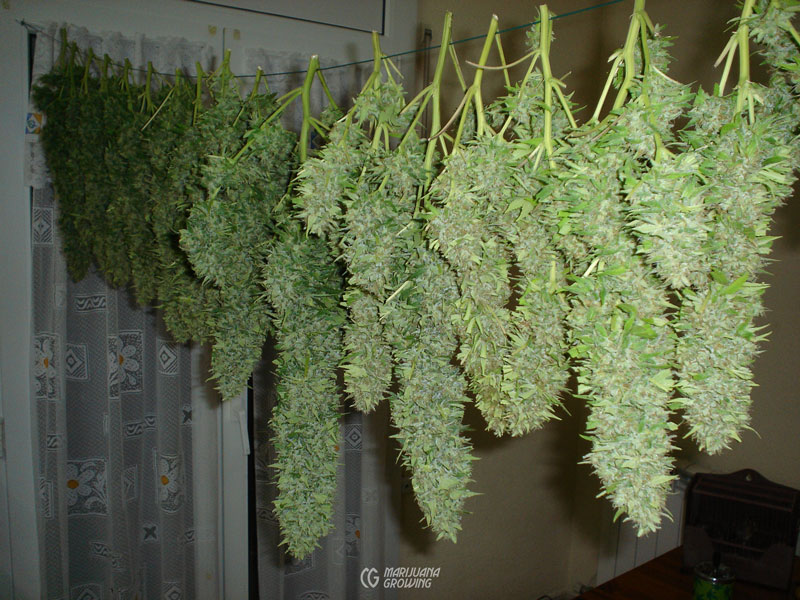
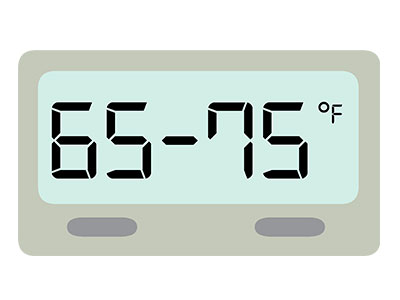
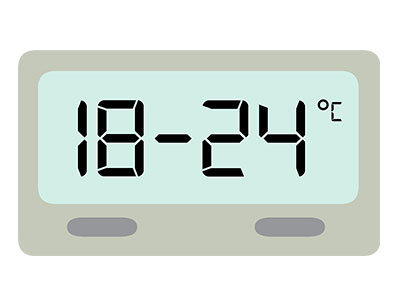
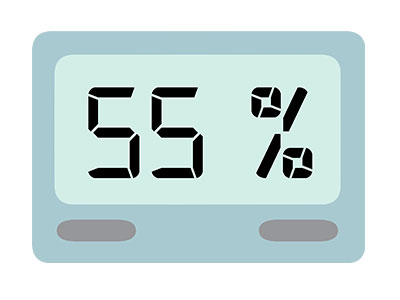
The ideal temperature in the drying room is between 65° and 75°F (18°– 24°C) and humidity about 55%. Temperatures below 65°F (18°C) slow drying, and humidity is more difficult to control. Humidity above 80% slows drying and increases the chances of mold attacks. Temperatures above 75°F (24°C) may cause buds to dry too fast, and humidity can also fall below the ideal 50% level more easily. Always use an accurate maximum/minimum thermometer and hygrometer to ensure temperature and humidity are kept in the ideal range.
Small harvests can be dried easily in a closet, cabinet, or a cardboard box that is a fraction of the growing area’s size. Large harvests require much more room. See Marijuana Horticulture: The Indoor/Outdoor Medical Grower’s Bible for more information.
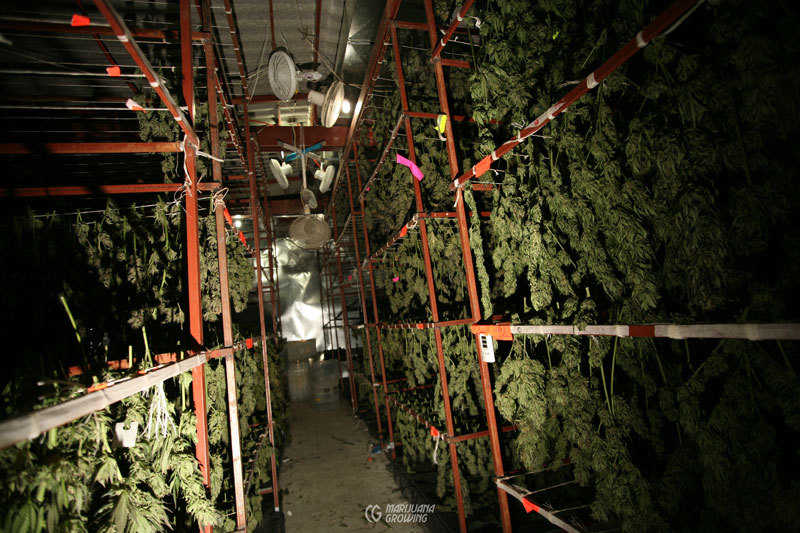
Use a small circulation fan to keep air moving in the drying room, but do not train the fan directly on buds or they will dry unevenly. A ventilation fan may also be necessary to help control temperature and humidity. Use an air conditioner or heater to control extreme humidity and temperatures.
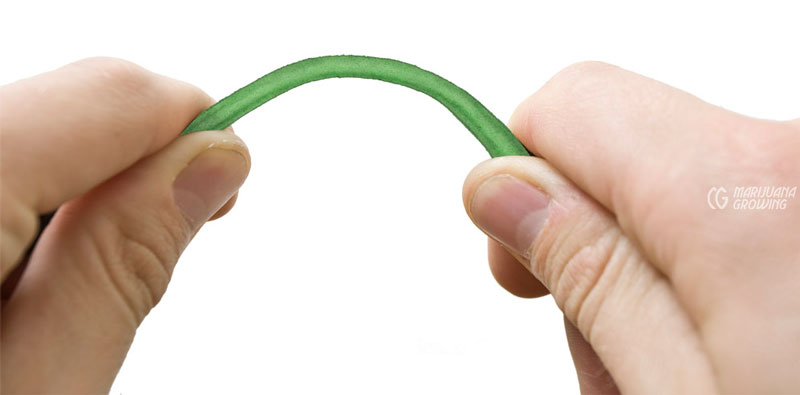
Bending and breaking cannabis plant stems is an indicator of dryness, but not an absolute measure. Dry buds burn well when rolled into a joint. Once dry, buds are ready to cure. Curing is essential!
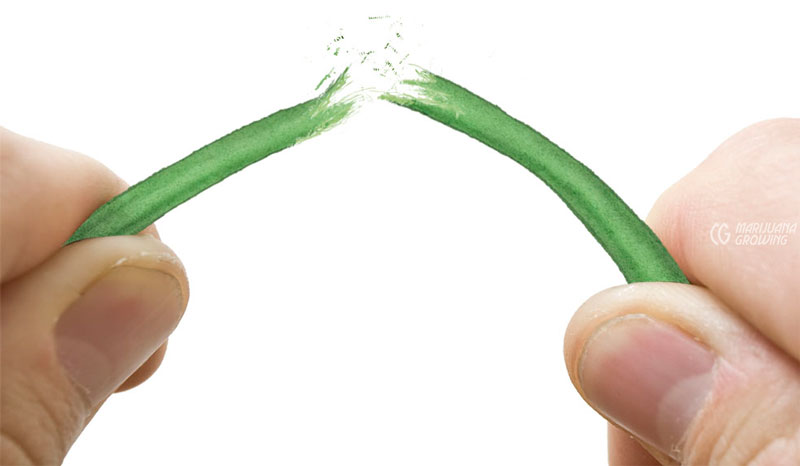
Check for dryness by bending a stem. The stem should snap rather than fold when bent. The bud should be dry to touch, but not brittle.
Cannabis Curing and Storage
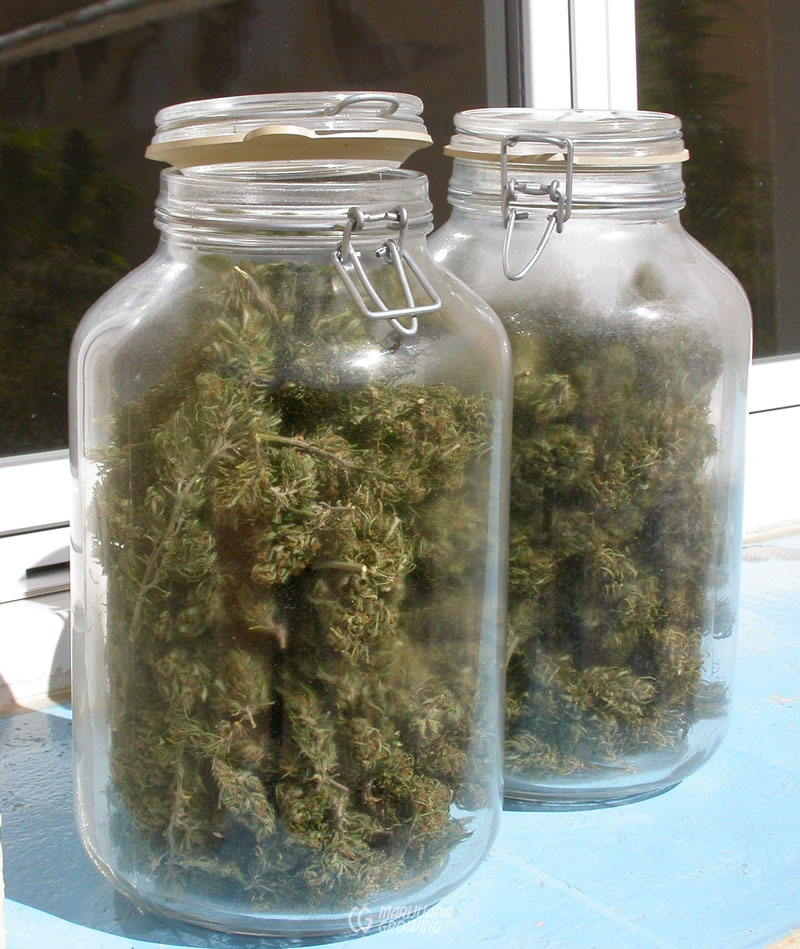
Once the buds are dry, they are ready for curing. The curing process lets buds dry evenly so they smoke smooth and taste sweet. When properly cured, all unnecessary moisture is removed and THC reaches its most psychoactive potential. Proper curing ensures buds are completely dry and much less susceptible to mold when stored.
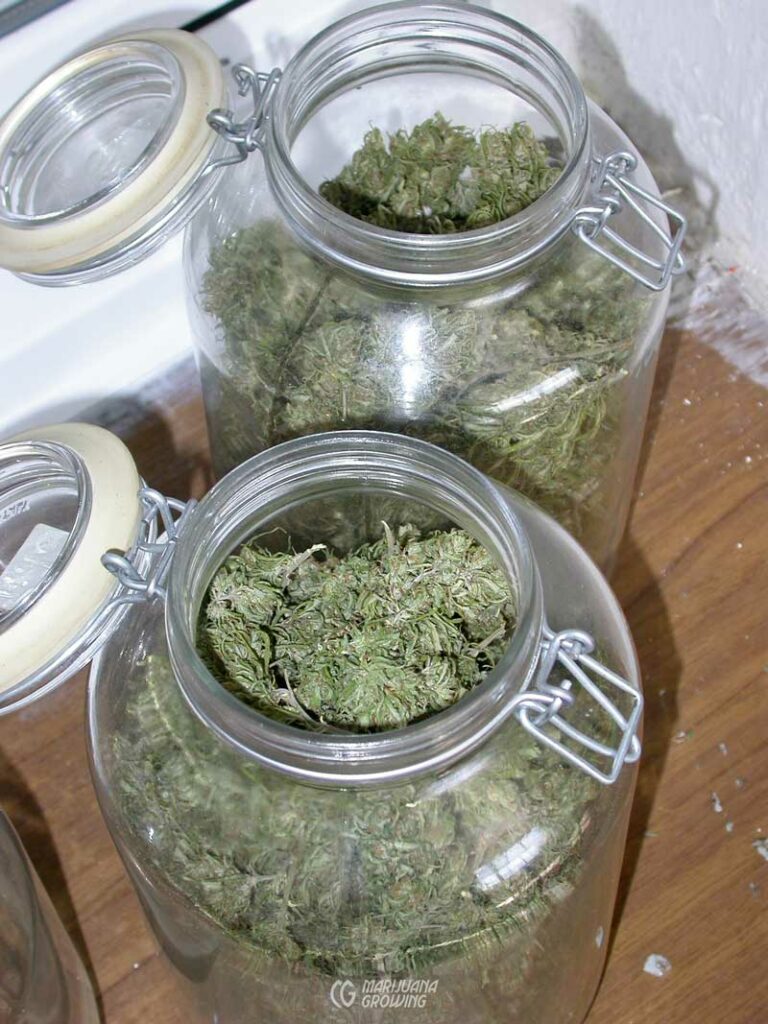
To cure buds, gently pack them into sealable airtight containers. Moisture will move from stems to drier foliage. Place the containers in a cool, dry, dark place. Open the container after 2–4 hours to let humid air escape. Leave the top off for 5–10 minutes so moisture evacuates. Close the container. Open the container for a few minutes every few hours to release excess moisture before closing the lid again. Depending upon moisture content, buds should be totally dry in a few days to 2 weeks. Gently squeeze buds to feel if they are less pliable and moist than they were a few hours before. Once they are evenly dry, they are ready to smoke or seal in an airtight container for storage.
Store packaged buds in a cool, dry, dark place. The owner of this Volkswagen Beetle stored buds in a cool, dry place, but he forgot to keep it dark. Buds stored in the refrigerator will stay fresh a few months longer. Make sure buds are in an airtight container when stored in the refrigerator to prevent moisture from entering the container.

